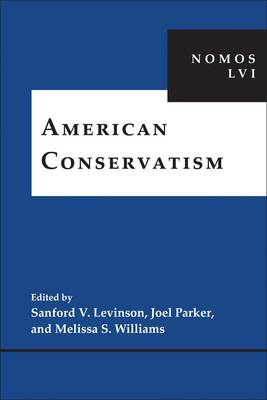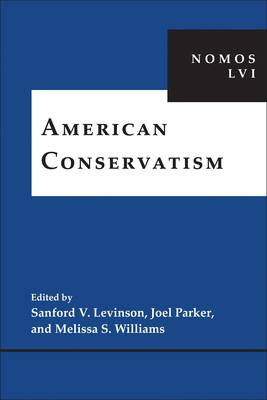
Bedankt voor het vertrouwen het afgelopen jaar! Om jou te bedanken bieden we GRATIS verzending (in België) aan op alles gedurende de hele maand januari.
- Afhalen na 1 uur in een winkel met voorraad
- In januari gratis thuislevering in België
- Ruim aanbod met 7 miljoen producten
Bedankt voor het vertrouwen het afgelopen jaar! Om jou te bedanken bieden we GRATIS verzending (in België) aan op alles gedurende de hele maand januari.
- Afhalen na 1 uur in een winkel met voorraad
- In januari gratis thuislevering in België
- Ruim aanbod met 7 miljoen producten
Zoeken
American Conservatism
Nomos LVI
€ 122,45
+ 244 punten
Omschrijving
A collection of essays that unpacks the history, nature, development, and beliefs of American Conservatism
The topic of American conservatism is especially timely--and perhaps volatile. Is there what might be termed an "exceptional" form of conservatism that is characteristically American, in contrast to conservatisms found in other countries? Are views that are identified in the United States as conservative necessarily congruent with what political theorists might classify under that label? Or does much American conservatism almost necessarily reflect the distinctly liberal background of American political thought? In American Conservatism, a distinguished group of American political and legal scholars reflect on these crucial questions, unpacking the very nature and development of American conservative thought. They examine both the historical and contemporary realities of arguments offered by self-conscious conservatives in the United States, offering a well-rounded view of the state of this field. In addition to synoptic overviews of the various dimensions of American conservative thought, specific attention is paid to such topics as American constitutionalism, the role of religion and religious institutions, and the particular impact of the late Leo Strauss on American thought and thinkers. Just as American conservatism includes a wide, and sometimes conflicting, group of thinkers, the essays in this volume themselves reflect differing and sometimes controversial assessments of the theorists under discussion.Specificaties
Betrokkenen
- Uitgeverij:
Inhoud
- Aantal bladzijden:
- 448
- Taal:
- Engels
- Reeks:
- Reeksnummer:
- nr. 10
Eigenschappen
- Productcode (EAN):
- 9781479812370
- Verschijningsdatum:
- 17/05/2016
- Uitvoering:
- Hardcover
- Formaat:
- Genaaid
- Afmetingen:
- 142 mm x 211 mm
- Gewicht:
- 612 g

Alleen bij Standaard Boekhandel
+ 244 punten op je klantenkaart van Standaard Boekhandel
Beoordelingen
We publiceren alleen reviews die voldoen aan de voorwaarden voor reviews. Bekijk onze voorwaarden voor reviews.








